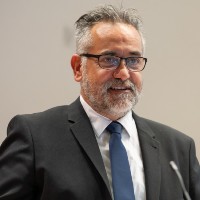Greece and Cyprus went through a painful crisis, but their economies have started growing again. What are the countries’ growth prospects? What should be the priorities for economic policy and reform? Have the lessons from the crisis been learnt?
The event touched on the above issues. Each of the four panel members gave a short presentation, and a Q&A session followed. Useful background for the presentations is available in the book “Beyond Austerity: Reforming the Greek Economy,” MIT Press (“Πέρα από τη Λιτότητα: Για μια Νέα Δυναμική στην Ελληνική Οικονομία,” Πανεπιστημιακές Εκδόσεις Κρήτης).
|
Speakers:
|
Gikas Hardouvelis, Professor of Finance and Economics, University of Piraeus in Greece
Sir Christopher Pissarides, Regius Professor of Economics, LSE; Professor of European Studies, University of Cyprus
Constantinos Petrides, Minister of Interior, Cyprus
Dimitri Vayanos, Professor of Finance, LSE
|
|
Chair:
|
Vassilis Monastiriotis, Associate Professor of Political Economy, LSE
|
|
Date:
|
Tuesday 27 November 2018
|
|
Time:
|
18:30-20:30
|
|
Venue:
|
Auditorium B108 A.Leventis Council - Senate Building
Aglantzia Campus, University of Cyprus
|
Slides
A PDF copy of the slides presented during the event is available here .
Photos
View photos here .
Video
Watch the video here

Gikas A. Hardouvelis is Professor of Finance and Economics in the Department of Banking and Financial Management of the University of Piraeus in Greece. He has a Ph.D. in Economics from U. C. Berkeley, and M. Sc. & B. A. degress in Applied Mathematics from Harvard University. From June 2014 to January 2015 he was the Minister of Finance of the Hellenic Republic.
Hardouvelis is Research Fellow at the Centre for Economic Policy Research in London, member of the Board of the Multinational Finance Society, member of the Academic Council of the Cyprus International Institute of Management, President of the Scholarship Committee of the Hellenic Harvard Foundation, a Trustee of Anatolia College, and member of Board of Directors and the Executive Committee of the Foundation for the Economic & Industrial Research.
His academic work extends in the fields of Finance and Macroeconomics and is published in prestigious top-ranking academic journals, including the American Economic Review, the Journal of Finance, the Quarterly Journal of Economics, the Journal of Monetary Economics, the Review of Financial Studies, The Journal of Money, Credit and Banking, the Review of Economics and Statistics, the Journal of Business, and other journals.

Sir Christopher Pissarides is the Regius Professor of Economics at the London School of Economics, a Professor of European Studies at the University of Cyprus and Chairman of the Council of National Economy of the Republic of Cyprus, and the Helmut & Anna Pao Sohmen Professor-at-Large of the Hong Kong University of Science and Technology. He was educated at the University of Essex and the London School of Economics (LSE), and he spent the bulk of his career at the LSE. He had long visits in the US Universities of Harvard, Princeton and California at Berkeley.
Sir Christopher specialises in the economics of labour markets, macroeconomic policy, economic growth and structural change. He was awarded the 2010 Nobel Prize in Economics, jointly with Dale Mortensen of Northwestern University and Peter Diamond of MIT, for his work in the economics of markets with frictions. Prior to that, in 2005, he became the first European economist to win the IZA Prize in Labor Economics, sharing it again with his collaborator Dale Mortensen. He has written extensively in professional journals, magazines and the press and his book Equilibrium Unemployment Theory is an influential reference in the economics of unemployment that has been translated in many languages. He is frequently quoted in the press on issues concerning the Eurozone and the future of European integration.
He is an elected Fellow of the British Academy, the Academy of Athens, the Academia Europaea and several other learned societies, and he is a Lifetime Honorary Member of the American Economic Association. In 2011 he served as the President of the European Economic Association. In 2011 he received the Grand Cross of the Republic of Cyprus, the highest honour of the Republic. He was knighted in 2013.

Dimitri Vayanos is Professor of Finance at the London School of Economics, where he also directs the Paul Woolley Centre for the Study of Capital Market Dysfunctionality. He is a Fellow of the British Academy, a Director and former Managing Editor of the Review of Economic Studies, a Research Fellow at CEPR and a former Director of its Financial Economics program, a Research Associate at NBER, and a former Director of the American Finance Association. His research, published in leading economics and finance journals, such as the Journal of Finance, the Journal of Financial Economics, the Quarterly Journal of Economics, the Review of Economic Studies, and the Review of Financial Studies, focuses on financial markets, and especially on what drives market liquidity, why asset prices can differ from assets’ fundamental values, why bubbles and crises can occur, and what are appropriate regulatory and policy responses. He is a former editor of the blog Greek Economists for Reform, one of the editors of the book “Beyond Austerity: Reforming the Greek Economy”, and one of the authors of the European Safe Bonds (ESBies) proposal.

Constantinos Petrides assumed office as Minister of Interior on the 11th of April 2017. Previously, has been the Deputy Minister to the President of the Republic of Cyprus since 1st March 2013. In addition to his other duties, he had been assigned by the President Nicos Anastasiades the leading role for the Growth Reform, including Civil Service Reform.
Prior to his appointment as the Deputy Minister, Mr. Petrides was the Director of the Office of the President of the Democratic Rally (9/2011 – 2/2013).
In 2006 he was hired at the European Commission in Brussels where he worked as an economist at the Directorate General for Agriculture and the Directorate General for Competition until September 2011. During his stay at the European Commission he served as negotiator of trade liberalisation agreements between the EU and third countries and also worked on issues of public aid in the field of transportations. From 2000 until 2006 he served as Senior Officer at the Association of Cyprus Banks and as representative of the Association to the European Banking Federation and the National Euro Changeover Committee.During the negotiations for Cyprus’ accession to the EU in 2000 he worked on issues of harmonisation at the Directorate for EU-Cyprus relations of the Planning Bureau.
He studied Economics at the University of Nottingham and then acquired an MSc in Political Economy of Transition in Europe from the London School of Economics and Political Sciences.

Vassilis Monastiriotis is an economist and economic geographer by training. He holds a PhD in Economic Geography (2002, London School of Economics, UK) an MSc in Economics (1996, University of Macedonia, Thessaloniki, Greece) and a BSc in Economics (1994, Aristotle University, Thessaloniki, Greece). Before joining the European Institute in 2004 he was Lecturer in the Department of Economics at Royal Holloway, University of London. He has previously worked as Research Fellow at the London School of Economics and the University of Reading and as a Course Lecturer in the Department of Geography at LSE.
He has published in a variety of academic journals, such as the Oxford Economic Papers, Empirical Economics, Review of Development Economics, British Journal of Industrial Relations, Economic and Industrial Democracy, Journal of Regional Science, Regional Studies, Urban Studies, and others; while he has co-authored a number of policy documents including for the European Commission and the Corporation of London. In 2008 he received the Moss Madden Memorial Medal for his paper on Union Retreat and Regional Economic Performance (published in Regional Studies).
He is affiliated to the ESRC Spatial Economics Research Centre and the Department of Geography and Environment (LSE), member of the Hellenic Observatory and Director of the LSE Research Unit on South Eastern Europe. He is Co- Editor of Spatial Economic Analysis, Committee Member of the British and Irish Section of the Regional Science Association, and member in various professional bodies.